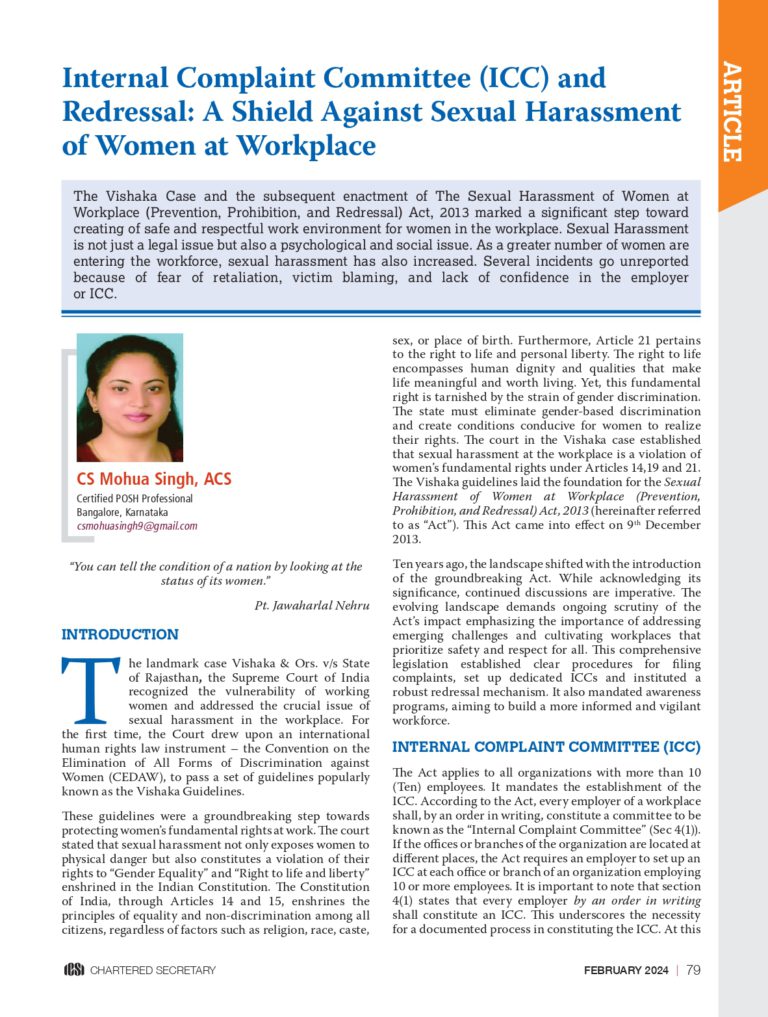The Sexual Harassment of Women at Workplace (Prevention, Prohibition and Redressal) (POSH) Act, 2013.
What is a workplace?
As per the POSH Act, ‘workplace’ includes any place visited by the employee arising out of or during the course of employment, including transportation provided by the employer for the purpose of commuting to and from the place of employment.
‘workplace’ includes:
-
- Government organizations, including Government companies, corporations, and cooperative societies.
- Any private sector organisation or a private venture, undertaking, enterprise, institution, establishment, society, trust, non-governmental organisation, unit, or service provider carrying on commercial, professional, vocational, educational, entertainment, industrial, health services or financial activities including production, supply, sale, distribution, or service.
- Hospitals/Nursing Homes.
- Sports Institutes/Facilities.
- Places visited by the employee (including while on travel) including transportation provided by the employer.
- A dwelling place or house.
A workplace covers the Unorganised sector as well.
The Act defines the Unorganised Sector as:
“Unorganised sector” in relation to a workplace means an enterprise owned by individuals or self-employed workers and engaged in the production or sale of goods or providing service of any kind whatsoever, and where the enterprise employs workers, the number of such workers is less than ten.
The POSH Act has introduced the concept of an ‘extended workplace’. In the case of Jaya Kodate vs. Rashtrasant Tukdoji Maharaj Nagpur University (2014), the Bombay High court stated that the definition of ‘workplace’ under the POSH Act is inclusive and deliberately kept wide by the Parliament to ensure that any area where women may be subjected to sexual harassment is not left unattended for.
Further, the Delhi High Court in Saurabh Kumar Mallick v. Comptroller & Auditor General of India (2008) observed that “A person can interact or do a business conference with other people while sitting in some other country by means of videoconferencing. It is also becoming a trend that office is run by certain CEOs from their residence. Obviously, members of the public would not have access to that place, though the personal staff of such an officer would be present there. In a case like this if such an officer indulges in an act of sexual harassment with an employee, say, his private secretary, it would not be open for him to say that he had not committed the act at ‘workplace’, but at his ‘residence’ and get away with the same.”
Therefore, sexual harassment occurring during work-from-home comes under the definition of workplace.
Who is an Employer?
An employer refers to:
- The head of the department, organisation, undertaking, establishment, enterprise, institution, office, branch or unit of the Appropriate Government or local authority or such officer specified on this behalf.
- Any person (whether contractual or not) responsible for the management, supervision and control of a designated workplace not covered under clause (1).
- A person or a household who employs or benefits from the employment of domestic workers or women employees.
Who is an Employee?
The definition of an ‘employee’ under the POSH Act is fairly wide to cover regular, temporary, ad hoc employees, individuals engaged on a daily wage basis, either directly or through an agent, contract labourers, co-workers, probationers, trainees, and apprentices, with or without the knowledge of the principal employer, whether for remuneration or not, working on a voluntary basis or otherwise, whether the terms of employment are express or implied.
Who is an aggrieved woman?
According to the Sexual Harassment of Women at Workplace (Prevention, Prohibition and Redressal) (POSH) Act, 2013:
“Aggrieved woman” means—
- In relation to a workplace, a woman, of any age whether employed or not, who alleges to have been subjected to any act of sexual harassment by the respondent.
- In relation to a dwelling place or house, a woman of any age who is employed in such a dwelling place or house.
As the act does not necessitate a woman to be an employee, even a customer/ client who may be sexually harassed at a place can claim protection under the POSH Act. It includes all women whether engaged directly or through an agent including a contractor, with or without the knowledge of the principal employer. They may be working for remuneration, on a voluntary basis, or otherwise. Their terms of employment can be expressed or implied. Further, the woman could be a co-worker, a contract worker, probationer, trainee, apprentice, or called by any other such name. The Act also covers a woman, who is working in a dwelling place or house.
Who can make a complaint under the Sexual Harassment of Women at Workplace (Prevention, Prohibition and Redressal) (POSH) Act, 2013?
- The Aggrieved Woman herself
- In the case of Physical Incapacity
- Her relative
- Friend
- Co-worker
- Office of National Commission for Women Commission or State Commission for Women
- Any person who has knowledge of the incident with the written consent of the complainant.
- In case of mental incapacity
- Her relative
- Friend
- Special educator
- Qualified psychiatrist or psychologist
- Guardian or authority under whose care she is receiving treatment or care.
- Any person who has knowledge of the incident jointly with any person mentioned above.
- In case a woman is unable to file a complaint for any other reason, any person who has knowledge of the incident with her written consent can file the complaint.
- In case of woman’s death:
- Any person who has knowledge of the incident with the written consent of her legal heir.
- Legal heir.
If a woman is a victim of sexual harassment, what should she do?
She can approach the Internal Complaints Committee (ICC) established by her organization under POSH with a written complaint.
Or
In case, the organisation does not have ICC or if she wants to make a complaint against the employer or if she works in the capacity of domestic help, then she can lodge her complaint with the Local Complaints Committee established in the respective district under the POSH.
Or,
She can contact the nearest police station to lodge an FIR against the perpetrator.




